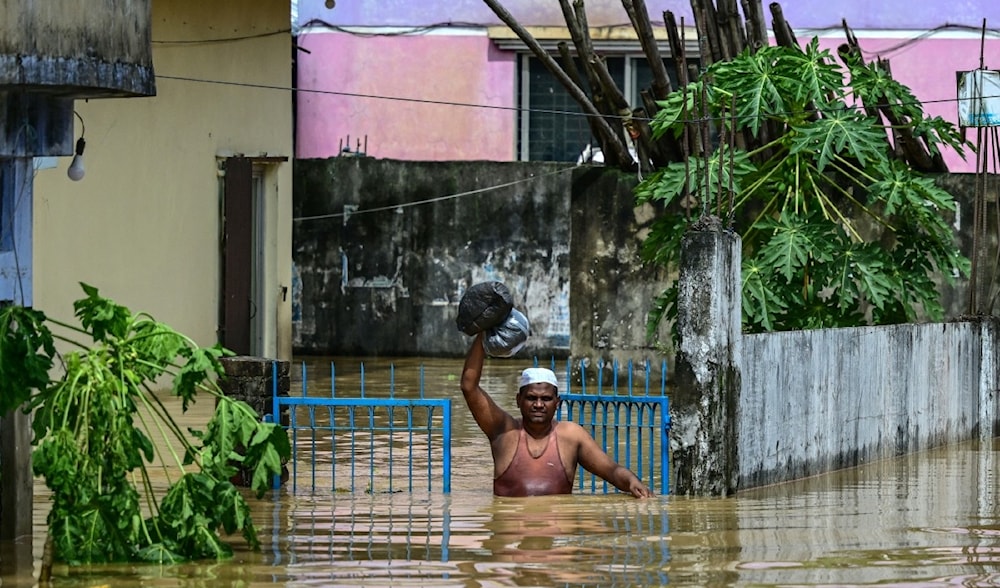Floods ease but 300,000 remain in emergency shelters: Bangladesh
The severe floods have killed at least 42 people in both Bangladesh and India since Monday.
-

A man carrying his belongings wades through flood waters in Feni, southeastern Bangladesh, on August 23, 2024. (AFP)
Floodwaters in Bangladesh are receding following days of severe flooding, but 300,000 remain in emergency shelters requiring aid, disaster officials reported Sunday.
The heavy floods, caused by heavy monsoon rain, have killed at least 18 people in Bangladesh while damaging highways and railways between the capital city of Dhaka and the main port city of Chittagong, ultimately restricting access and disrupting business activities.
Rescue teams composed of the army, air force, and navy have been deployed to aid displaced citizens and bring aid to people, Disaster Management Minister Faruk-e-Azam said.
"The flood situation is improving as the flood water started to recede," Azam told AFP, adding that the ministry is "working to restore communication in the affected areas so that we can distribute relief food."
The ministry reported that over 5.2 million people have been affected by the floods, with 307,000 seeking refuge in shelters.
"We are also taking steps so that contagious diseases don't spread," Azam said.
The floods have also impacted neighboring country India, leaving a trail of destruction and killing at least 24 people in the Tripura state since Monday.
300,000 Bangladeshis seek shelter as floods swamp country
Almost 300,000 Bangladeshis rushed to emergency shelters on Sunday amid floods that swamped the country, disaster officials said.
The floods resulted in the deaths of at least 42 people across Bangladesh and India since the start of the week. Many casualties were caused by the consequent landslides.
Lufton Nahar, 60, was fortunate enough to arrive at a relief shelter in Feni, one of the worst-hit districts near the border with India's Tripura state. He told AFP that his house was entirely flooded. "Water is flowing above our roof. My brother brought us here by boat. If he hadn't, we would have died."
Damage to highways and railways between the capital of Dhaka, and the major port city of Chittagong has hindered access to heavily flooded areas and disrupted business operations.
Cox's Bazar, a district housing about a million Rohingya refugees from Myanmar, is one of the areas most severely impacted.
With a population of 170 million, Bangladesh is among the most vulnerable countries to both disasters and the impacts of climate change, according to the Global Climate Risk Index, especially due to its hundred rivers and frequent, recurring floods within the last few decades.
The overall region is susceptible to such disastrous incidents where an annual monsoon rain causes widespread damage every year. However, due to climate change, there is an increase in extreme weather events and shifting patterns.

 3 Min Read
3 Min Read








